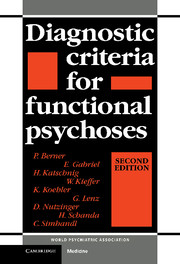D - Schizoaffective psychoses
Published online by Cambridge University Press: 07 September 2010
Summary
The diagnosis and therapy of patients with atypical psychoses has been a subject of research in psychiatry since the end of the last century. In order to differentiate this disorder from schizophrenia and manic-depressive illness, and also to describe new typologies, some authors have focused on its cross-sectional symptomatology, laying special emphasis on such symptoms as mood-incongruent psychotic symptoms (delusions, hallucinations), formal thought disorders, disturbances of affect, and manic or depressive symptoms in general; other authors, meanwhile, have focused on its course (acute onset, full remission, chronic course, etc.).
The term ‘schizoaffective’ was coined by Kasanin in 1933, and for historical reasons we have included his criteria in our book. In the following years, and up until now, a variety of new descriptions and names have emerged for disorders with a blending of schizophrenic and affective symptomatology, e.g., ‘schizophreniform psychosis’ (Langfeldt, 1939), ‘cycloid psychosis’ (Kleist, 1928; Leonhard, 1979; Perris, 1974; Perris and Brockington, 1981), ‘remitting schizophrenia’ (Vaillant, 1965), ‘good prognosis schizophrenia’ (Stephens et al., 1966), ‘reactive psychosis’ (McCabe and Strömgren, 1975), ‘psychogenic psychosis’ (Faergemann, 1963; Retterstøl, 1978), ‘schizophrenieähnliche Emotionspsychosen’ (Labhardt, 1963), ‘oneiroiden Emotionspsychosen’ (Boeters, 1971), ‘Legierungspsychosen’ (Arnold et al., 1965), ‘atypische Psychosen’ (Pauleikoff, 1957; Bochnik and Gärtner-Huth, 1982). In addition to Kasanin's criteria, which were formulated by us from his work (Kasanin, 1933) we have included the most well-known and widely used diagnostic criteria for schizoaffective psychoses. These are the research diagnostic criteria (Spitzer et al., 1978b); the criteria for cycloid psychoses (Perris and Brockington, 1981); and the latest version of DSM–III–R (1987). Several authors have formulated specific diagnostic criteria, e.g., Welner et al. (1974); Perris (1974); Kendell (cited in Brockington and Leff, 1979); and Berner et al. (1983a).
- Type
- Chapter
- Information
- Diagnostic Criteria for Functional Psychoses , pp. 181 - 182Publisher: Cambridge University PressPrint publication year: 1992



